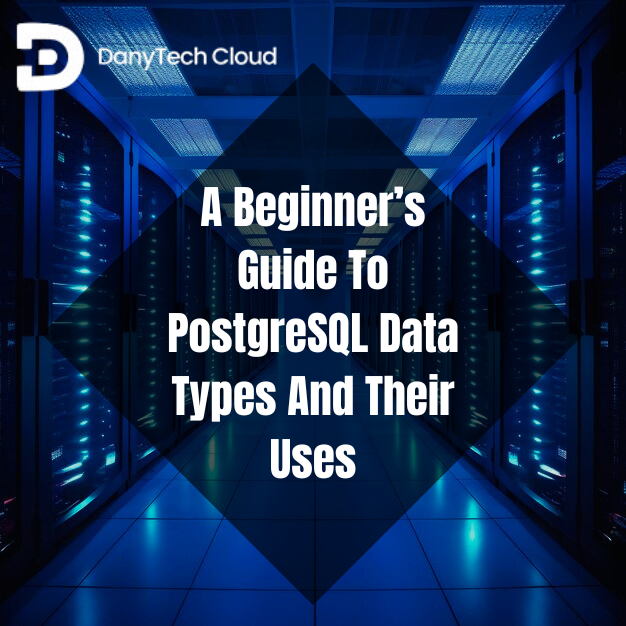PostgreSQL is a reliable database system that many developers, startups, and businesses rely on to manage data efficiently. One of the main features that makes it so trustworthy is its vast range of data types. It basically ensures that it can store different kinds of data or information.
You can consider data types as containers that are designed to hold certain things. These may be dates, texts, numbers, true/false values, or others. Choose the right container to keep your data fast, organized, and easy to work with. It is applicable whether you are working on dedicated PostgreSQL hosting, shared PostgreSQL hosting, or running an enterprise PostgreSQL database.
Why Data Types Matter in PostgreSQL
At the centre of every column and table in your database is a data type. When you choose the right data type, you can ensure multiple things.
- Ensures data validity
- Saves storage space
- Improves query performance
- Minimizes bugs in your app logic
PostgreSQL supports a variety of data types that are more than the basics. These may be text, UUIDs, JSON, numeric types, and also custom types.

Common PostgreSQL Types and When to Use Them
Here are some of the most common PostgreSQL data types, and when you can use them for better performance.
- Numbers: Postgres Integer Types and Decimal Types
PostgreSQL offers you a few ways to store numbers according to the type of number it is.
- Whole Numbers (like 1, 50, or 1000)
Use Postgres integer types such as “BIGINT” or “INTEGER”. These are ideal for things such as item counts, age, and user IDs.
- Numbers with Decimals (like 3.14 or 10.99)
Go with Postgres numeric types or the Postgres decimal type. These are particularly useful in billing, financial, or pricing apps where accuracy matters.
- Text: Postgres Type Text
If you need to store messages, descriptions, addresses, or names, use the Postgres type text. PostgreSQL allows you to store text in three flexible ways:
- Customer feedback
- Short or long product descriptions
- Usernames or emails
You do not need to worry a lot about which text type to use; PostgreSQL handles it smoothly. Remember to use it when you are storing words, not numbers.
- True or False: Postgres Boolean Type
The Postgres boolean type is ideal when you need a simple yes or no field. For instance,
- Has the order been shipped?
- Is the user subscribed?
- Is the profile verified?
It is a small data type, however, super useful when creating features according to the on and off decisions.
- Decimal or Floating Numbers: Postgres Float Type
This is perfect for storing numbers that do not need to be exact. These may be scores or ratings. For example:
- Average temperature
- 4.5 out of 5 stars
- Customer satisfaction score
If there is no problem with a small rounding difference, the Postgres float type is a better choice than decimals.
- Unique IDs: Postgres UUID Type
Every item in your database must have a unique way to be identified. It is especially in larger apps or systems with users internationally. That is where the Postgres UUID type enters. It is like giving every entry its own unique fingerprint, and it is very hard to duplicate or guess.
This is particularly helpful in apps where privacy matters or where you are building across different systems. These may be web platforms and mobile apps at the same time.
- Flexible Data: Postgres JSON Type
Need to store information that does not always follow the same pattern? Postgres JSON type will be the perfect fit. It is perfect for:
- Product specifications
- API responses
- User settings
Instead of making a new column for every possible feature or setting, you can keep everything organized inside one JSON field. This helps when your data demands are always changing or flexible.

What If You Need to Change a Data Type?
Sometimes, you may start with one data type but later realize you might need something else. Maybe you began with numbers and now require decimals. PostgreSQL allows you to change a column type later on. This is called the Postgres change column type action.
Remember that it is best to plan ahead. If you have a large database, changing types can take time. It is particularly when you are on shared PostgreSQL hosting, where system resources are shared among different users.
Hosting Your PostgreSQL Database: Things to Know
Your choice of data types also plays a crucial role in how you host your database. Here is how:
- Shared PostgreSQL Hosting
This is an affordable way to get started. It is perfect for small apps, testing, or development projects. But it might not be the best match for complex or heavy data types. These may be large JSON fields or high-volume numeric data.
- Dedicated PostgreSQL Hosting
In this type of hosting, you get a private environment just for your business or app. It manages larger data types better, gives you more control, and provides faster speed. Perfect if you are scaling up, need custom tuning, or handling sensitive data.
- Enterprise PostgreSQL Database
If your business demands speed, non-stop performance, and high security, enterprise hosting is your go-to database. It is built for big data, mission-critical apps, and large teams. It also allows you to optimize how different Postgres types are used and stored.
Conclusion
Choosing the right PostgreSQL data types is not complicated, but it matters. Whether you are storing prices, preferences, IDs, or names, there is a perfect Postgres type to match.
So, when you explore different ways to host your PostgreSQL databases, consider the kind of data you store. It is the first yet crucial step toward building a smarter, faster, and better application.




